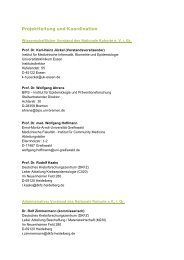Scientific Concept of the National Cohort (status ... - Nationale Kohorte
Scientific Concept of the National Cohort (status ... - Nationale Kohorte
Scientific Concept of the National Cohort (status ... - Nationale Kohorte
You also want an ePaper? Increase the reach of your titles
YUMPU automatically turns print PDFs into web optimized ePapers that Google loves.
Control <strong>of</strong> data protection<br />
203<br />
A.7 Ethical aspects<br />
The responsible data protection commissioner for each study center will ensure that data<br />
collection and handling comply with <strong>the</strong> data protection concept that has been developed<br />
and in accordance with <strong>the</strong> Federal Data Protection Act and all o<strong>the</strong>r legislation concerning<br />
data protection and confidentiality.<br />
A.7.2.5 Provision <strong>of</strong> health information to participants<br />
At <strong>the</strong> end <strong>of</strong> <strong>the</strong> visit in <strong>the</strong> study center or soon after, if desired, participants will receive<br />
<strong>the</strong> results from <strong>the</strong> medical examinations conducted at <strong>the</strong> study center and analyzed<br />
baseline diagnostic results. By reporting standard ranges and giving respective explanations<br />
concerning <strong>the</strong>ir individual results, participants will be provided with information that<br />
gives meaning to <strong>the</strong> examinations. If <strong>the</strong>re is any concern about <strong>the</strong>ir health <strong>status</strong>, participants<br />
will be advised to contact <strong>the</strong>ir general practitioner or ano<strong>the</strong>r physician. Moreover,<br />
participants will be informed and advised to contact a physician in <strong>the</strong> case <strong>of</strong> severe findings<br />
which need to be fur<strong>the</strong>r clarified. No medical diagnosis will be provided. A detailed<br />
feedback at <strong>the</strong> time <strong>of</strong> <strong>the</strong> baseline examination also goes beyond <strong>the</strong> scope <strong>of</strong> <strong>the</strong> study.<br />
On <strong>the</strong> consent form, participants will advise as to what kind <strong>of</strong> information <strong>the</strong>y want and<br />
how <strong>the</strong>y want to be informed. New biomarkers implicating a very high risk <strong>of</strong> a preventable<br />
and serious disease may be found. If such findings become available and are corroborated<br />
in agreement with relevant medical expertise, participants may be contacted and <strong>the</strong>se<br />
findings will be communicated in accordance with an ethics commission. To respect <strong>the</strong><br />
“right <strong>of</strong> nescience,” this will only be done if <strong>the</strong> participant agreed to be contacted for such<br />
information.<br />
We aim to ensure that subjects understand that study participation does not provide a personal<br />
health check but ra<strong>the</strong>r will provide important and valuable information concerning <strong>the</strong><br />
etiology <strong>of</strong> chronic diseases and for future prevention and treatment. Thus, participation will<br />
help enhance o<strong>the</strong>r people’s health in <strong>the</strong> future.<br />
Feedback <strong>of</strong> incidental findings<br />
Concerning <strong>the</strong> use <strong>of</strong> MRI, one important issue warrants specific attention in connection<br />
with <strong>the</strong> target <strong>of</strong> asymptomatic voluntary participants, namely incidental findings.<br />
Incidental findings represent an important and very critical issue within <strong>the</strong> imaging substudy<br />
<strong>of</strong> <strong>the</strong> <strong>National</strong> <strong>Cohort</strong> and dedicated guidelines will be developed in collaboration<br />
with <strong>the</strong> pertinent ethics committees. Overall, <strong>the</strong> guidelines will balance <strong>the</strong> moral obligation<br />
<strong>of</strong> reporting findings, anticipated benefits for <strong>the</strong> participants, and <strong>the</strong> scientific validity<br />
without intervention in terms <strong>of</strong> an unbiased assessment. Based on <strong>the</strong> experience in <strong>the</strong><br />
SHIP study 822 , only those incidental findings that are <strong>of</strong> potential relevance for <strong>the</strong> participants<br />
are provided to <strong>the</strong>m.<br />
We have already prepared a draft list <strong>of</strong> serious incidental findings to be provided to <strong>the</strong><br />
participants on head, ENT/neck, thorax, heart, abdomen, urogenital system, spine, vascular<br />
system, and musculoskeletal system. This draft will be finalized toge<strong>the</strong>r with specialists<br />
from <strong>the</strong> different fields from Germany and <strong>the</strong> UK.<br />
For fur<strong>the</strong>r incidental findings, which are not predefined in <strong>the</strong> list, but are <strong>of</strong> potential relevance,<br />
we will establish an advisory board consisting <strong>of</strong> experts <strong>of</strong> all major, imaging-related<br />
clinical specialties, as well as epidemiologists and ethicists who will meet on a regular basis<br />
to discuss and develop guidelines related to distinct imaging findings on real cases (figure<br />
7.1). Over <strong>the</strong> course <strong>of</strong> <strong>the</strong> preparatory phase, guidelines will be in place to classify imag-<br />
A.7



